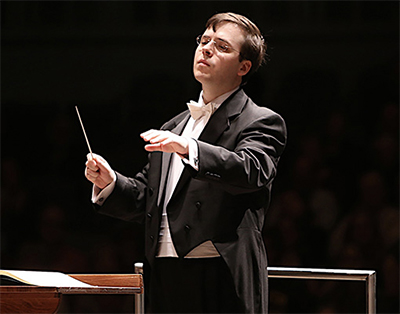by Mike Telin

On Monday, November 19 at 7:30 pm at West Shore Unitarian Universalist Church, the Rocky River Chamber Music Society will present a concert titled Gala Serenade Evening featuring these exquisite works by Dvořák and Brahms. James Feddeck conducts members of The Cleveland Orchestra and friends — Saeran St. Christopher and Jessica Sindel, flutes, Sally Sherwin, piccolo, Jeffrey Rathbun and Corbin Stair, oboes, Daniel McKelway and Benjamin Freimuth, clarinets, Barrick Stees and Jonathan Sherwin, bassoons, Richard King, David Brockett, and Meghan Guegold, horns, Wesley Collins, Lembi Veskimets, Eliesha Nelson and Jessica Pasternak, violas, Charles Bernard, Linda Atherton, and Julie King, cellos, and Mark Atherton and Scott Dixon, double bass. And yes, the concert is free.
The second of Brahms’ two serenades was completed in 1859, when the composer was in his late 20s. The five-movement work is scored for double woodwinds, violas, cellos, and basses. “What is amazing about this piece is that there are no violins in the orchestra. It’s a lovely work and I wish people played it more often,” Feddeck said.
The conductor noted that the A Major Serenade is an example of a young Brahms who was venturing into writing orchestral music for the first time. “We know that Robert and Clara Schumann encouraged Brahms to develop more and more as a composer, and to write for mediums other than the piano. Although Robert had already passed away when Brahms wrote this, he dedicated it to Clara.”
While Brahms did not write another orchestral work for 14 years, Feddeck said the Serenade is an example of the composer’s emerging genius. “His orchestral writing here is so beautiful in the way that he combines the instruments, and yet it’s hard to imagine that he was just easing into it. Although Brahms is not often talked about in terms of his melodies, in this case they are so beautiful. And I think the smaller instrumentation, and especially the way we’re going to do it with a smaller string group, is reminiscent of the way that Brahms wrote for the piano.”
Feddeck has always been drawn to Brahms and said that his “pilgrimage” into the composer’s music began with the symphonies. “One of the first orchestral scores I had was a volume of his symphonies. I remember dissecting them at the piano and really obsessing over them. I first discovered this piece about 10 years ago and I’ve conducted it a couple of times now.”
Earlier this year Feddeck found himself in Hamburg, the birthplace of Brahms. “I was in the church where he was baptized and I think his parents were married there as well. That’s all part of my Brahms pilgrimage.”
Scored for two oboes, two clarinets, two bassoons, three horns, cello, and bass, Dvořák’s d-minor Serenade was premiered on November 17, 1878. The piece soon caught the attention of Brahms, who wrote to violinist Joseph Joachim suggesting that he listen to the piece. And just as the Schumann’s made introductions for Brahms, Brahms did the same for Dvořák.
“I think that without Brahms we might not have heard of Dvořák, or at least not as much,” Feddeck said. “He introduced Dvořák to his publisher in Berlin and to his circle in Vienna. So there is a Brahms-Dvořák link that people might not immediately realize.”
Feddeck pointed out that the Dvořák’s Serenade was a work that turned the composer’s life around. “When he wrote it he was having a bit of a tough time. He and his wife lost both their children — first their daughter, and then in 1877 they lost their three-year old son. Although he had written many works, he was not known outside of the Czech Republic. Then he composed this piece I think in two weeks — he suddenly met Brahms — and things took off. So there’s a wonderful connection between these two men who inspired and helped each other.”
Wrapping up our conversation, Feddeck said that he is thrilled to be part of this Rocky River Chamber Music Society concert. “When Dan McKelway told me that he had dreamt up this program and when he was talking to his Cleveland Orchestra colleagues, they said, why don’t you have James do it, and I was very humbled by that. Dan has done a terrific job — it’s a great series with a great mission.”
Published on ClevelandClassical.com November 12, 2018.
Click here for a printable copy of this article



